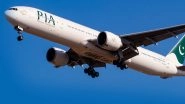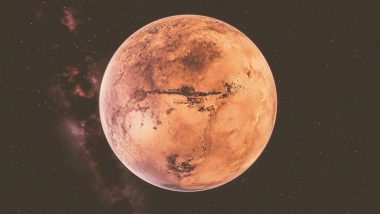In an attempt to make its year-long Mars surface simulation a success, the US space agency NASA is looking out for ‘highly driven individuals' who would live in a 1,700-square-foot Mars Dune Alpha module 3D-printed by ICON. The three one-year Mars surface simulations located at NASA's Johnson Space Center are part of the Crew Health and Performance Exploration Analog series of missions. The program has three simulations, with the first starting in 2022 and each of these programs will have four crew members spending 365 days in isolated mock habitats of the Red Planet.
The applications to dive into this program are available now and will close on September 12, 2021. Participants must be between the ages of 30 and 55, hold a master's degree in a STEM discipline, and have at least two years of comparable work experience to be considered. Mars Is Calling! NASA Invites Applications for Mission That Will Simulate Life on Red Planet, Know Eligibility Criteria and How To Apply.
Basic eligibility for this mission:
- Be a US citizen or permanent resident
- Be within the ages of 30-55
- Possess a master's degree in a STEM field, including engineering, biological science, physical science, computer science, or mathematics, from an accredited institution.
- Have at least two years of related professional experience in a STEM field or at least 1,000 hours of pilot-in-command time on jet aircraft.
- Be able to pass the NASA long-duration flight astronaut physical.
The master's degree requirement can also be met by:
- Two years (36 semester hours or 54 quarter hours) of work toward a doctoral program in a related science, technology, engineering, or math field.
- A completed Doctor of Medicine or Doctor of Osteopathic Medicine degree.
- Completion (or current enrollment that will result in completion by June 2021) of a nationally recognized test pilot school program.
- Participants with a Bachelor’s degree and other specific qualifications (e.g., relevant additional education, military, or at least 4 years of professional experience in a STEM field) may also be considered.
Speaking of the program, Grace Douglas, lead scientist for NASA’s Advanced Food Technology research effort at NASA’s Johnson Space Center in Houston, said that the analog is critical for testing solutions to meet the complex needs of living on the Martian surface. The analogues will fund research on strategies and technology for preventing and resolving potential issues on future human spaceflight trips to the Moon and Mars. Simulations on Earth will help us understand and counter the physical and mental challenges astronauts will face before they go.
(The above story first appeared on LatestLY on Aug 10, 2021 11:50 AM IST. For more news and updates on politics, world, sports, entertainment and lifestyle, log on to our website latestly.com).













 Quickly
Quickly












